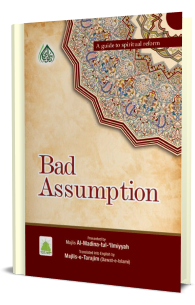
Plea
Think positive
A few days ago, we were trying to get in touch with someone quite important. One of us called him, but he did not answer. I was notified of this but immediately assumed he must be driving. Having a positive assumption like this is a blessing and a direct influence of Dawat-e-Islami and Ameer-e-Ahl-e-Sunnat, ‘Allamah Maulana Muhammad Ilyas Attar Qadiri Razavi دَامَتْ بَـرَكَاتُـهُـمُ الْـعَـالِـيَهْ. Without such influence, I could have just as easily assumed that the person was trying to avoid us or not answering our calls for some ulterior motive. If such a thought came in my mind, and I mentioned this thought as well, then what proof would I have to back my claim?
People often drive themselves into a frenzy when someone does not answer their call or immediately reply to a message, before barraging the person with direct or indirect insults. Islam not only prohibits such unethical behaviour but also strongly discourages pessimism and harbouring unjustified negative thoughts.
Scrutinise yourself; how do you react when someone does not respond to your call, message, or knock on the door? Do you immediately assume the worst about the other person? Whatever your immediate thoughts are, they reflect the state of your heart. Thinking negatively about someone without a valid Shar’i reason is a symptom of a spiritually ill heart, as the Ulama have explained: ‘A filthy thought is the product of a filthy heart,’ (Fayz-ul-Qadeer lil-Munaawi, vol. 3, p. 157, under the Hadith 2901). Is it wise or foolish to consider oneself as pious while possessing a filthy heart? - the answer will be self-evident for the discerning reader.
Having good opinions about others and treating people with kindness are at the heart of our beautiful faith. Both acts are forms of worship and have many benefits in this world and the hereafter. For one, as a powerful reducer of stress and an effective way of combating overthinking, positive thinking prevents stress build up and fosters a relaxed mind. It has physiological benefits too as it supports a healthier immune system. In contrast, thinking negatively about others is not only harmful in the hereafter but has many adverse outcomes in this life such as depression, anxiety, increased sugar levels, blood pressure, restlessness, and insomnia.
Thinking badly about people is the lethal sword which all too often severs relationships and causes enmity between brothers, incessant arguments between mothers-in-law and their daughters-in-law, and distrust between spouses. In the worst cases, divorce or permanent resentment between relatives is the final outcome. It has been noted:
Individuals who think negatively bout others are more prone to paralysis and diseases of the heart. A study by the American Heart Association found that people who hold adverse feelings towards others and because of it become victims of mental stress and remain in anger for the majority of the time, their chances of developing heart disease and paralysis are increased by 86%. (Tafseer Siraat-ul-Jinaan, vol. 9, p. 436)
Unfortunately, many people disregard these stark realities and continue with their cynical ways. They forget everything good that has happened to them, focusing instead on a single negative incident. Some even interpret the kindness of others as evil while others activate their ‘negative-thought metres’ by merely seeing something or by hearing someone speak against them or another person.
Opting to focus on others instead of evaluating your own faults and shortcomings is detrimental to your health and wellbeing. One psychologist even remarked, ‘The vast majority of mental health issues are caused by negative thoughts. Patients would constantly recall only the bad that has happened to them and eventually, these thought patterns contributed to neurotic disorders, anxiety, depression, etc.’
The initial step in treating such patients, even before prescribing drugs, involves highlighting their negative thinking patterns so that they can understand it themselves and accept the fact that these are their negative thoughts. After this, patients are encouraged to focus on the positive aspects and people in their lives. This is an effective method to shift from a negative frame of mind to a positive one.
The beauty of Islam is that it teaches us to think positively and deems that to be a form of worship, as declared by our Beloved Prophet, Sayyiduna Muhammad صَلَّى الـلّٰـهُ عَلَيْهِ وَاٰلِهٖ وَسَلَّم: ‘A good thought is from excellent worship,’ (Abu Dawood, vol. 4, p. 387, Hadith 4993). Therefore, as long as the Shari’ah does not permit otherwise, positively interpret the words and actions of fellow Muslims and hold a good opinion about Allah Almighty, knowing that whatever He sends your way is good.
Commenting on the aforementioned hadith, Mufti Ahmad Yar Khan رَحْمَةُ الـلّٰـهِ عَلَيْه remarked:
This prophetic statement elucidates several matters:
1. Thinking positively about Allah Almighty and having hope in Him is a lofty act of worship.
2. Worship begets hope in Allah Almighty; this hope is instilled in those who worship Him.
3. Hope in Allah Almighty must be complimented with obedience and worship. Having hope in Him while disobeying Him is like hoping to harvest wheat after planting seeds of barley.
4. Maintaining good opinions about Muslims and avoiding bad assumptions is a form of worship.
This Hadith also suggests that thinking positively about Muslims is a product of worship, i.e., only worshippers can harness positive thinking while sinners will only have bad thoughts. (Mirat-ul-Manajih, vol. 6, p. 621, summarised)
I urge all of you to adopt positive thinking and to encourage your children, family, relatives, and friends to take a constructive and positive approach. Participate in the activities of Dawat-e-Islami, join the Madani Qafilahs, tune into Madani Muzakarahs, watch Madani Channel, and read the Faizan-e-Madinah magazine. May Allah Almighty enable us obey Him.
اٰمِیْن بِجَاہِ النَّبِیِّ الْاَمِیْن صَلَّی اللہ تَعَالٰی عَلَیْہِ وَاٰلہٖ وَسَلَّم


















Comments